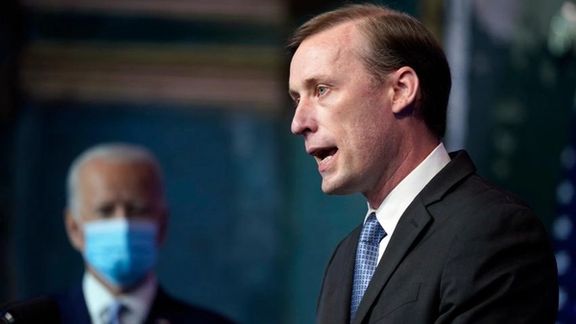Uncertainty Rules Over Iran Nuclear Deal

Reviving the 2015 Iran nuclear deal remains uncertain despite earlier progress US officials reiterate, as the issue of delisting Iran's IRGC remains unresolved.

Reviving the 2015 Iran nuclear deal remains uncertain despite earlier progress US officials reiterate, as the issue of delisting Iran's IRGC remains unresolved.
"We've made progress over the course of the last several weeks. There are still some issues left," White House national security adviser Jake Sullivan said Wednesday, adding that whether there would be a closure or not was unclear.
Sulivan insisted that the United States is diligently seeking to "put Iran's nuclear program back in a box" but that offers little assurance to those who are wary of US concessions to make a deal possible.
The uncertainty highlighted by US officials appear to be mainly rooted in the impasse over Iran's insistence that Washington should remove the Revolutionary Guards (IRGC) from its list of Foreign Terrorist Organization (FTO).
As inking a new nuclear agreement gets delayed, opposition becomes more vocal in Washington. Republicans and some Democrats have been expressing strong objections, especially against delisting the IRGC. Particularly worrisome for the administration could be serious reservations Bob Menendez, the Chairman of the Senate foreign Relations Committee has expressed.
State Department Spokesperson Ned Price also appeared uncertain Tuesday and said despite optimism in recent weeks, restoration of the 2015 nuclear deal, Joint Comprehensive Plan of Action (JCPOA) remained uncertain.
The onus is on Iran whether it is willing to accept the mutual return of the US and Iran to compliance with the deal, he said. Iran's Foreign Minister Hossein Amir-Abdollahian similarly said on Wednesday that the onus is on the US to show good faith and make the restoration of the JCPOA possible. He has repeatedly accused the US of "demanding too much" and bringing "illogical and unjustifiable demands" to the negotiation table.
The White House Spokeswoman Jen Psaki said Thursday that there was "ongoing negotiation" over delisting the IRGC. "I would just note that the status quo where we stand has done nothing to make us safer in any regard. In fact, the Islamic Revolutionary Guard has only been strengthened," she said.
The delisting of the IRGC appears to be Iran's last condition for signing a deal after nearly a year of intense negotiations. Iranian officials have so far refrained from directly naming the delisting of the IRGC as Iran's deal breaker demand and only refer to it as "Iran's redlines" in their public statements, presumably to raise less controversy abroad.
Axios Middle East correspondent Barak David in an article on Wednesday claimed that Iranian officials have not agreed to publicly commit to de-escalation in the region as a condition for delisting the IRGC.
According to David's sources, two US and one Israeli official, the Iranian side has not agreed to a public declaration of its commitment to change its behavior in the region and want instead to provide a private side-letter to the US.
The issue of delisting IRGC has also raised strong opposition by Israel. Prime Minister Naftali Bennet and Foreign Minister Yair Lapid issued a statement on March 18 criticizing what they said was US intentions to delist the IRGC.
Bennett and Lapid appealed to the United States not to remove the top military force of its archfoe, which it considers as a threat to Israel's existence, from the Foreign Terrorist Organizations list.